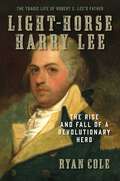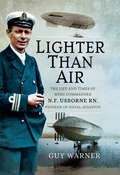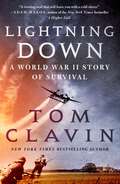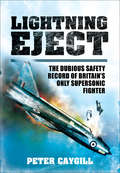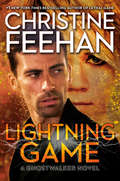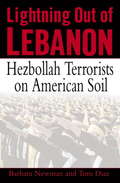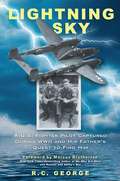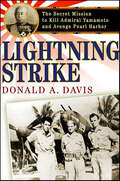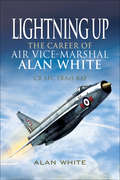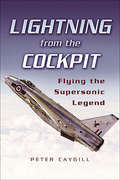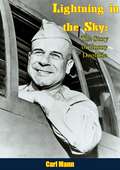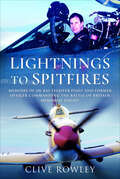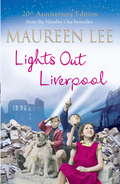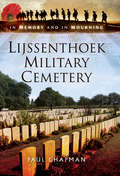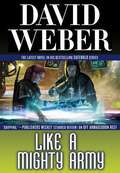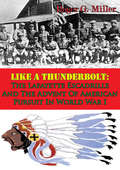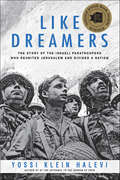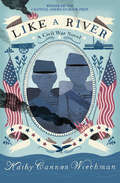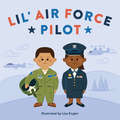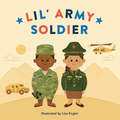- Table View
- List View
Light Perpetual: A Novel
by Francis SpuffordFrom the critically acclaimed and award‑winning author of Golden Hill, a mesmerizing and boldly inventive novel tracing the infinite possibilities of five lives in the bustling neighborhoods of 20th-century London.Lunchtime on a Saturday, 1944: the Woolworths on Bexford High Street in southeast London receives a delivery of aluminum saucepans. A crowd gathers to see the first new metal in ages—after all, everything&’s been melted down for the war effort. An instant later, the crowd is gone; incinerated. Among the shoppers were five young children. Who were they? What futures did they lose? This brilliantly constructed novel lets an alternative reel of time run, imagining the life arcs of these five souls as they live through the extraordinary, unimaginable changes of the bustling immensity of twentieth-century London. Their intimate everyday dramas, as sons and daughters, spouses, parents, grandparents; as the separated, the remarried, the bereaved. Through decades of social, sexual, and technological transformation, as bus conductors and landlords, as swindlers and teachers, patients and inmates. Days of personal triumphs, disasters; of second chances and redemption. Ingenious and profound, full of warmth and beauty, Light Perpetual illuminates the shapes of experience, the extraordinariness of the ordinary, the mysteries of memory and expectation, and the preciousness of life.
Light-Horse Harry Lee: The Rise and Fall of a Revolutionary Hero - The Tragic Life of Robert E. Lee's Father
by Ryan Cole"Light-Horse Harry blazes across the pages of Ryan Cole's narrative like a meteor—and his final crash is as destructive. Cole tells his story with care, sympathy, and where necessary, sternness. This book is a great, and sometimes harrowing read." —Richard Brookhiser, senior editor at National Review and author of Founding Father: Rediscovering George Washington Who was "Light-Horse Harry" Lee? Gallant Revolutionary War hero. Quintessential Virginia cavalryman. George Washington’s trusted subordinate and immortal eulogist. Robert E. Lee’s beloved father. Founding father who shepherded the Constitution through the Virginia Ratifying Convention. But Light-Horse Harry Lee was also a con man. A beachcomber. Imprisoned for debt. Caught up in sordid squabbles over squalid land deals. Maimed for life by an angry political mob. Light-Horse Harry Lee’s life was tragic, glorious, and dramatic, but perhaps because of its sad, ignominious conclusion historians have rarely given him his due—until now. Now historian Ryan Cole presents this soldier and statesman of the founding generation with all the vim and vigor that typified Lee himself. Scouring hundreds of contemporary documents and reading his way into Lee’s life, political philosophy, and character, Cole gives us the most intimate picture to date of this greatly awed but hugely talented man whose influence has reverberated from the founding of the United States to the present day.
Lighter Than Air: The Life and Times of Wing Commander N.F. Usborne RN, Pioneer of Naval Aviation
by Guy WarnerNeville Florian Usborne entered the Royal Navy as a cadet in 1897. In the years between him joining up and the outbreak of the First World War, he engaged in a huge number of enterprises and endeavours. Praise and respect garnered in accordance with his achievements all helped to establish his reputation in later years as an 'irreplaceable' pioneer and a leading light of early British airship design. His fertile imagination and enterprising spirit fused to form a dynamic personality, able in wartime to draw up countless schemes in an effort to outwit the enemy. His chief task during the Great War was to dream up new tactics and designs to combat the Zeppelin menace, perceived as one of the most damaging threats of the entire conflict. He was also deeply involved in the design of the very successful SS and Coastal Class airships; indeed, during 1915 he was actually appointed Inspector Commander of Airships at the Admiralty. Unfortunately, his illustrious career was destined to be cut short in 1916 when he was killed testing a prototype of one of his own designs. This new biography seeks to shine a light on an overlooked pioneer of early aviation and it does so in entertaining and reverential style. The importance of Usborne the pioneer is made plain; as one of his contemporaries commented upon his death No one can talk of the early days of British airship design without mention of his name and work. A personality was lost on that February day which was irreplaceable.
Lighthouses & Keepers
by Dennis L. NobleFrom the East Coast to the West Coast, the Great Lakes to the Gulf of Mexico and Hawaiian Islands, this handsome book helps explain the lure of lighthouses in the United States. Among the most recognized structures of the maritime world, these lonely sentinels by the sea have long been the subject of paintings and photographs. Today they continue to capture public imagination as Americans flock to their sites for visits and volunteer to help preserve these endangered structures. This book covers all aspects of the subject, not only lighthouses and lightships but buoys, buoy tenders, fog signals, and their keepers. The work is as rich in historical information as it is in rarely seen photographs, and fourteen maps guide readers to the exact locations of the lighthouses. Readers are also treated to stories of shipwrecks and rescues, including the extraordinary story of Ida Lewis, head keeper of the light at Lime Rock, Rhode Island, who rescued eighteen people from the sea.
Lighting the Fuse
by Lucy LewisImagine standing over a bomb - you need to make a choice. Remember, your life depends on it.In this extraordinary memoir, Lucy Lewis reveals the hidden world of bomb disposal training and how she came to be the UK's first female bomb disposal expert. From joining Sandhurst to rushing to her first bomb disposal call-out, Lucy's story is full of high stakes and tense situations that for most of us, are beyond comprehension. Lucy's story however is also a deeply inspirational one - joining the military in the 1980s just as women were taking on more dangerous roles, Lucy's every move was watched and scrutinised. This didn't hold her back however, and this is how she broke through the ceiling, fought against sexism and achieved something no woman had ever done before. Lighting the Fuse is an eye-opening memoir, that reveals the hidden world of being a woman in the military and how a young woman with an ordinary background, made history - not just once, but twice.
Lighting the Fuse
by Lucy LewisImagine standing over a bomb - you need to make a choice. Remember, your life depends on it.In this extraordinary memoir, Lucy Lewis reveals the hidden world of bomb disposal training and how she came to be the UK's first female bomb disposal expert. From joining Sandhurst to rushing to her first bomb disposal call-out, Lucy's story is full of high stakes and tense situations that for most of us, are beyond comprehension. Lucy's story however is also a deeply inspirational one - joining the military in the 1980s just as women were taking on more dangerous roles, Lucy's every move was watched and scrutinised. This didn't hold her back however, and this is how she broke through the ceiling, fought against sexism and achieved something no woman had ever done before. Lighting the Fuse is an eye-opening memoir, that reveals the hidden world of being a woman in the military and how a young woman with an ordinary background, made history - not just once, but twice.
Lightning Down: A World War II Story of Survival
by Tom ClavinAn American fighter pilot doomed to die in Buchenwald but determined to survive.On August 13, 1944, Joe Moser set off on his forty-fourth combat mission over occupied France. Soon, he would join almost 170 other Allied airmen as prisoners in Buchenwald, one of the most notorious and deadly of Nazi concentration camps. Tom Clavin's Lightning Down tells this largely untold and riveting true story.Moser was just twenty-two years old, a farm boy from Washington State who fell in love with flying. During the War he realized his dream of piloting a P-38 Lightning, one of the most effective weapons the Army Air Corps had against the powerful German Luftwaffe. But on that hot August morning he had to bail out of his damaged, burning plane. Captured immediately, Moser’s journey into hell began.Moser and his courageous comrades from England, Canada, New Zealand, and elsewhere endured the most horrific conditions during their imprisonment... until the day the orders were issued by Hitler himself to execute them. Only a most desperate plan would save them.The page-turning momentum of Lightning Down is like that of a thriller, but the stories of imprisoned and brutalized airmen are true and told in unforgettable detail, led by the distinctly American voice of Joe Moser, who prays every day to be reunited with his family.Lightning Down is a can’t-put-it-down inspiring saga of brave men confronting great evil and great odds against survival.
Lightning Eject: The Dubious Safety Record of Britain's Only Supersonic Fighter
by Peter Caygill"The English Electric Lightning entered RAF squadron service in 1960 and continued flying in the interceptor role until 1988. It had a stunning world-beating performance with a top speed in excess of Mach 2 and a climb rate that would take it to 40,000 feet in a little over 3 minutes. The aircrafts safety record, however, left much to be desired. During a period in the early 1970s the attrition rate was the loss of a Lightning every month. There was a six per cent chance of a pilot experiencing an engine fire and a one in four chance that he would not survive.This book looks at Lightning accidents and incidents in chronological order using the official accident reports, Board of Inquiry findings and firsthand accounts from pilots. It puts the reader very much in the cockpit. "
Lightning Game (A GhostWalker Novel #17)
by Christine FeehanDanger and passion fuse in this electrifying GhostWalker novel from #1 New York Times bestselling author Christine Feehan. <P><P>GhostWalker Rubin Campo’s rough upbringing made him into the man he is today: strong, steadfast and wary of outsiders. When he and his brother return to their family’s homestead in the Appalachian Mountains, he can immediately sense that a stranger has taken up residence in their cabin—a woman who just happens to be a GhostWalker too. <P><P> Jonquille looks deceptively delicate but is clearly a fighter. She also doesn’t seem to care that Rubin could kill her where she stands. She sought him out, wanting to connect on their shared interest in electrical charges. As one of the first failed GhostWalker experiments, Jonquille can produce lightning with her body—but she can’t control it. <P><P> Their connection is magnetic, their abilities in sync. Rubin knows she’s his match, the answer to a lifetime of pain and intense loneliness. But Jonquille came to him with hidden intentions, ones that threaten to destroy their bond before it can truly begin.… <p><p>A New York Times Bestseller</b>
Lightning Out of Lebanon: Hezbollah Terrorists on American Soil
by Tom Diaz Barbara NewmanBefore September 11, 2001, one terrorist group had killed more Americans than any other: Hezbollah, the "Party of God." Today it remains potentially more dangerous than even al Qaeda. Yet little has been known about its inner workings, past successes, and future plans--until now. Written by an accomplished journalist and a law-enforcement expert, Lightning Out of Lebanon is a chilling and essential addition to our understanding of the external and internal threats to America. In disturbing detail, it portrays the degree to which Hezbollah has infiltrated this country and the extent to which it intends to do us harm. Formed in Lebanon by Iranian Revolutionary Guards in 1982, Hezbollah is fueled by hatred of Israel and the United States. Its 1983 truck-bomb attack against the U.S. Marine barracks in Beirut killed 241 soldiers--the largest peacetime loss ever for the U.S. military--and caused President Reagan to withdraw all troops from Lebanon. Since then, among other atrocities, Hezbollah has murdered Americans at the U.S. embassy in Lebanon and the Khobar Towers U.S. military housing complex in Saudi Arabia; tortured and killed the CIA station chief in Beirut; held organizational meetings with top members of al Qaeda-including Osama bin Laden-and established sleeper cells in the United States and Canada. Lightning Out of Lebanon reveals how, starting in 1982, a cunning and deadly Hezbollah terrorist named Mohammed Youssef Hammoud operated a cell in Charlotte, North Carolina, under the radar of American intelligence. The story of how FBI special agent Rick Schwein captured him in 2002 is a brilliantly researched and written account. Yet the past is only prologue in the unsettling odyssey of Hezbollah. Using their exclusive sources in the Middle East and inside the U.S. counterterrorism establishment, the authors of Lightning Out of Lebanon imagine the deadly future of Hezbollah and posit how best to combat the group which top American counterintelligence officials and Senator Bob Graham, vice-chairman of the Senate Intelligence Committee, have called "the A Team of terrorism."
Lightning Over the Treasury Building: An Expose Of Our Banking And Currency Monstrosity, America's Most Reprehensible And Un-american Racket
by John R. ElsomA clear and concise treatise of the banking and money system of the United States as manipulated by the international bankers, by whom governments are controlled, wars promoted, peoples exploited and the real wealth of the nation gathered unto themselves through the process of mortgage and foreclosure—together with a constitutional remedy for our national dilemma.
Lightning Sky: A U.S. Fighter Pilot Captured during WWII and His Father's Quest to Find Him
by R.C. GeorgeA U.S. fighter pilot captured by the enemy. A father determined to rescue his son. One of the most remarkable and moving true stories of faith and perseverance to come out of World War II. October 6, 1944. Twenty-year-old Army Air Corps Second Lieutenant David “Mac” Warren MacArthur was on a strafing mission over Greece when a round of 88-mm German anti-aircraft flak turned his P-38 Lightning into a comet of fire and smoke. Dave parachuted to safety as the Lightning lived up to her name and struck the Adriatic Sea like a bolt of flames. In minutes, he was plucked from the water—only to find himself on the wrong end of a German rifle pointing straight at his head. Dave’s father, Lieutenant Colonel Vaughn MacArthur, was a chaplain with the 8th Armored Division of Patton’s Third Army when he learned of his son’s capture. He made it his personal mission to find him. For the duration of the war, as Dave was shuttled from camp to camp—including Dachau—his father never stopped searching. Then in May 1945, Vaughn’s last hope was Stalag VII-A in Moosburg, Germany. Through the barbed wire fence, he cried out his son’s name. Incredibly, out of tens of thousands of POWs, one of them, squinting into the sunlight, turned and smiled. Father and son spent the next two weeks together celebrating, a forever cherished memory. Over the next twenty-five years, Dave would go on to honor his father on rescue missions of his own, becoming a highly decorated and genuine American war hero. In both Korea and Vietnam, Dave would carry with him the legacy of a great man who gave everything to save his son. An inspiring, harrowing, and unforgettable chronicle of love of family and love of country, Lightning Sky is a timeless testament to extraordinary lives in extraordinary times.
Lightning Strike: The Secret Mission to Kill Admiral Yamamoto and Avenge Pearl Harbor
by Donald A. DavisThis is the story of the fighter mission that changed World War II. It is the true story of the man behind Pearl Harbor--Admiral Isoroku Yamamoto--and the courageous young American fliers who flew the million-to-one suicide mission that shot him down.Yamamoto was a cigar-smoking, poker-playing, English-speaking, Harvard-educated expert on America, and that intimate knowledge served him well as architect of the Japanese attack on Pearl Harbor. For the next sixteen months, this military genius, beloved by the Japanese people, lived up to his prediction that he would run wild in the Pacific Ocean. He was unable, however, to deal the fatal blow needed to knock America out of the war, and the shaken United States began its march to victory on the bloody island of Guadalcanal.Donald A. Davis meticulously tracks Yamamoto's eventual rendezvous with death. After American code-breakers learned that the admiral would be vulnerable for a few hours, a desperate attempt was launched to bring him down. What was essentially a suicide mission fell to a handful of colorful and expendable U.S. Army pilots from Guadalcanal's battered "Cactus Air Force": - Mississippian John Mitchell, after flunking the West Point entrance exam, entered the army as a buck private. Though not a "natural" as an aviator, he eventually became the highest-scoring army ace on Guadalcanal and the leader of the Yamamoto attack. - Rex Barber grew up in the Oregon countryside and was the oldest surviving son in a tightly knit churchgoing family. A few weeks shy of his college graduation in 1940, the quiet Barber enlisted in the U.S. Army. - "I'm going to be President of the United States," Tom Lanphier once told a friend. Lanphier was the son of a legendary fighter squadron commander and a dazzling storyteller. He viewed his chance at hero status as the start of a promising political career.- December 7, 1941, found Besby Holmes on a Pearl Harbor airstrip, firing his .45 handgun at Japanese fighters. He couldn't get airborne in time to make a serious difference, but his chance would come. - Tall and darkly handsome, Ray Hine used the call sign "Heathcliffe" because he resembled the brooding hero of Wuthering Heights. He was transferred to Guadalcanal just in time to participate in the Yamamoto mission---a mission from which he would never return.Davis paints unforgettable personal portraits of men in combat and unravels a military mystery that has been covered up at the highest levels of government since the end of the war.
Lightning Up: The Career of Air Vice-Marshal Alan White CB AFC FRAeS RAF
by Alan WhiteAlan White served in the RAF from 1953 to 1987 roughly the period of the Cold War. His introduction to flying came in his University Air Squadron. This seduced him into dropping out of University and joining the RAF. He initially had success during the piston-engine stages of his training but damage to a Vampire T11 and a bad start on the Hunter Weaponry Course set his confidence back until he recovered during service with his first Hunter Squadron. The infamous Duncan Sandys' cuts of 1957 caused the closure of his squadron and he found himself towing air-to-air gunnery targets, but luckily he was then moved to instruct on the Hunter Operational Conversion Unit where he developed his solo aerobatic display skills. He was then posted to take Hunters to Singapore and form a Squadron. He became involved with the SEATO response to assist the Thai governments request against communist insurgents from Laos and spent five months at Chiang Mai camping in a paddy field. After attending Staff College he was posted to Aden at a time of growing terrorist activity. He worked with the C-in-C, Admiral Sir Michael Le Fanu. Upon his return to the UK he trained to fly the supersonic Lightning fighter and eventually was promoted to lead a squadron. There followed a period of rapid promotion and he became Station Commander at RAF Leuchars. His later appointments as Air Commodore included Director of Operations (Air Defence), Senior Staff Officer HQ 11 Group, Air Commodore Plans at HQ Strike Command (where he assisted in the Falklands conflict) until he was promoted to his final rank and appointed Deputy Commander RAF Germany and then finally he became Commandant, RAF Staff College. His account is full of interesting flying detail and the internal workings of the RAF during those dangerous Cold War days.
Lightning from the Cockpit: Flying the Supesonic Legend (Aviation Ser.)
by Peter CaygillThe English Electric Lightning was the only single-seat supersonic interceptor fighter designed and manufactured in the UK. It saw service with the RAF in the sixties and seventies and gained a worthy reputation for its speed ( in excess of Mach 2 ) and phenomenal rate of climb. It was, however, a not entirely reliable aeroplane and over fifty were lost during its operational career. In this book, the author has gathered together 16 personal accounts of what it was like to fly the Lightning, thrilling stories that convey the immense brute power of the machine and also its many pitfalls. It will enthrall the enormous following the aircraft still enjoys. Two are now flying in South Africa and four are being restored to flight-worthy condition in the UK. To see a Lightning take off and climb vertically until it vanishes into the sky is one of the most spectacular sights in aviation.
Lightning in the Sky: The Story of Jimmy Doolittle
by Carl MannOriginally published in 1943, this is a biography of Jimmy Doolittle (1896-1993), a highly decorated officer in the United States Army Air Corps who pioneered in all phases of aeronautical achievement and commanded the Doolittle Raid on Japan during World War II.He became the first pilot to take the "blind" out of flying and complete the "outside loop", set numerous speed records, and won many racing trophies. Promoted to lieutenant general, he was also awarded the Medal of Honor for his valor and leadership as commander of the Doolittle Raid, a bold long-range retaliatory air raid on the Japanese main islands weeks after the attack on Pearl Harbor. His Tokyo flight is widely regarded as one of the coups of the Second World War.Doolittle also commanded the 12th Air Force over North Africa, the 15th Air Force over the Mediterranean, and the 8th Air Force over Europe.
Lightnings to Spitfires: Memoirs of an RAF Fighter Pilot and Former Officer Commanding the Battle of Britain Memorial Flight
by Clive RowleyA former fighter pilot chronicles his career flying for the Royal Air Force for over four decades in this action-packed memoir. For forty-four years, Clive Rowley flew with the Royal Air Force, and for thirty-one of those years he specialized as an air defense fighter pilot. Such was his love of fast fighter aircraft that, in order to stay flying, he transferred to Specialist Aircrew terms of service, relinquishing any chance of further promotion above his rank of squadron leader. During those years Clive flew Lightnings, Hawks, and Tornado F.3s but, perhaps more intriguingly, for eleven years he flew Hurricanes and Spitfires with the Battle of Britain Memorial Flight (BBMF), the RAF&’s, if not the world&’s most famous &“warbird&” display team, which he ultimately led and commanded. Many readers will have watched him, perhaps unknowingly, as he flew these iconic aircraft, often alongside the Lancaster, at air shows and large-scale commemorations around the UK and Europe. During the Cold War, Clive flew the BAC Lightning from Gütersloh in Germany and in the UK, becoming an expert in the art of air combat in the process. Then for sixteen years he flew the Tornado F.3 as the RAF moved into expeditionary operations. Packed with humorous and often hair-raising anecdotes, but also revealing the shock and sorrow he felt at the deaths of friends and colleagues, this book is a highly detailed account of life as a fighter pilot in the RAF in the last three decades of the twentieth century and into the twenty-first. Clive is open about the fears he sometimes felt in this dangerous world and how he allayed them to continue flying for more than four decades. This book is illustrated with wonderful photographs from his time on the front line as well as with the BBMF, many of which have never been published before. If you have ever wondered what it is like to fly supersonic jet fighters, like the Lightning and the Tornado F.3, or iconic &“warbirds,&” such as the Hurricane and Spitfire, Clive Rowley brings you into those cockpits and shares his experiences.
Lights Out Liverpool: (Pearl Street 1)
by Maureen LeeNumber One bestseller Maureen Lee's first novel of the hugely popular Pearl Street series.As Britain stands alone against a monstrous enemy, the inhabitants of Pearl Street, in Liverpool, face hardship and heartbreak with courage and humour.The war touches each of them in a different way: for Annie Poulson, a widow, it means never-ending worry when her twin boys are called up and sent to France; Sheila Reilly's husband, Cal, faces the terror of U-Boat attacks; Eileen Costello is liberated from a bitter, loveless marriage when her husband is sent to Egypt and she goes to work in a munitions factory - and falls in love. And Jessica Fleming, down on her luck, is forced to return to the street she'd hoped never to see again.
Lijssenthoek Military Cemetery (In Memory and in Mourning)
by Paul ChapmanThis is a comprehensive and highly emotive volume, borne of years of intensive research and many trips to the battlefields of the Great War. It seeks to humanise the Lijssenthoek Military Cemetery, to offer the reader a chance to engage with the personal stories of the soldiers whose names have been chiseled there in stone. Poignant stories of camaraderie, tragic twists of fate and noble sacrifice have been collated in an attempt to bring home the reality of war and the true extent of its tragic cost. It is hoped that visitors to the battlefields, whether their relatives are listed within or not, will find their experience enriched by having access to this treasure trove of stories.
Like A Mighty Army (Safehold #7)
by David WeberFor centuries, the world of Safehold, last redoubt of the human race, lay under the unchallenged rule of the Church of God Awaiting. The Church permitted nothing new--no new inventions, no new understandings of the world. What no one knew was that the Church was an elaborate fraud--a high-tech system established by a rebel faction of Safehold's founders, meant to keep humanity hidden from the powerful alien race that had destroyed old Earth. Then awoke Merlyn Athrawes, cybernetic avatar of a warrior a thousand years dead, felled in the war in which Earth was lost. Monk, warrior, counselor to princes and kings, Merlyn has one purpose: to restart the history of the too-long-hidden human race. And now the fight is thoroughly underway. The island empire of Charis has declared its independence from the Church, and with Merlyn's help has vaulted forward into a new age of steam-powered efficiency. Fending off the wounded Church, Charis has drawn more and more of the countries of Safehold to the cause of independence and self-determination. But at a heavy cost in bloodshed and loss--a cost felt by nobody more keenly that Merlyn Athrawes. The wounded Church is regrouping. Its armies and resources are vast. The fight for humanity's future isn't over, and won't be over soon... David Weber's Like a Mighty Army is the hotly anticipated seventh volume in the New York Times bestselling Safehold series.
Like A Thunderbolt: The Lafayette Escadrille And The Advent Of American Pursuit In World War I [Illustrated Edition]
by Roger G. MillerIncludes 29 IllustrationsThe advent of an American squadron, or "escadrille," within the French air force, the Service Aeronautique, had been far from a simple process. French leaders initially held the belief, common at the time, that the war begun in 1914 would be a short one. The potential value of American volunteers fighting for France both for propaganda purposes and for helping bring the power of the New World into the war on the side of the Allies was thus irrelevant at first. By early 1915, however, the French began to accept American volunteers and assign them to escadrilles. In early 1916, the Service Aeronautique united several of these men in an elite chasse unit, which quickly earned an enviable reputation for audacity, bravery, and élan.Success of this unit, the Lafayette Escadrille, had three consequences. First, its existence encouraged a large number of Americans, far more than needed in one escadrille, to volunteer for French aviation. These individuals, identified unofficially as members of a "Lafayette Flying Corps," served in numerous French air units. Second, the publicity surrounding the Lafayette Escadrille contributed favorable press for the Allied cause, strengthened ties between France and the U.S., and ultimately helped prepare the U.S. to participate on the Allied side of the conflict. Third, the existence of a large body of experienced American pilots provided combat veterans for the Air Service of the American Expeditionary Forces (AEF) in France when the U.S. ultimately entered the war. These veterans helped instill in the U.S. Air Service the attitudes and practices of the Service Aeronautique, an infusion especially reflected in two U.S. pursuit squadrons, the 103rd Aero Squadron, made up of Lafayette Escadrille pilots, and the 94th Aero Squadron, the most famous American combat squadron of the war.
Like Dreamers: The Story of the Israeli Paratroopers Who Reunited Jerusalem and Divided a Nation
by Yossi Klein Halevi“Powerful. . . . beautifully written . . . . There is much to admire . . . especially Mr. Halevi’s skill at getting inside the hearts and minds of these seven men” —Ethan Bronner, New York TimesFollowing the lives of seven young members from the 55th Paratroopers Reserve Brigade, the unit responsible for restoring Jewish sovereignty to Jerusalem during the 1967 Six Day War, acclaimed journalist Yossi Klein Halevi reveals how this band of brothers played pivotal roles in shaping Israel’s destiny long after their historic victory. While they worked together to reunite their country in 1967, these men harbored drastically different visions for Israel’s future.One emerges at the forefront of the religious settlement movement, while another is instrumental in the 2005 unilateral withdrawal from Gaza. One becomes a driving force in the growth of Israel’s capitalist economy, while another ardently defends the socialist kibbutzim. One is a leading peace activist, while another helps create an anti-Zionist terror underground in Damascus.Featuring eight pages of black-and-white photos and maps, Like Dreamers is a nuanced, in-depth look at these diverse men and the conflicting beliefs that have helped to define modern Israel and the Middle East.“A beautifully written and sometimes heartbreaking account of these men, their families, and their nation.” —Booklist, starred review“Halevi's book is executed with imagination, narrative drive, and, above all, deep empathy for a wide variety of Israelis, and the result is a must-read for anyone with an interest in contemporary Israel and the Israeli-Palestinian conflict. —Publishers Weekly, starred review“Mr. Halevi’s masterly book brings us into [the] . . . debate and the lives of those who live it.” —Elliott Abrams, Wall Street Journal
Like a River: A Civil War Novel (Highlights Doodlerama#174; Ser.)
by Kathy Cannon WiechmanWhen Leander Jordan and Paul Settles enlist in the Union army, they each carry deep and dangerous secrets. And when they meet in a Union hospital, they begin to discover each other's secrets and form a bond that will prove impossible to break. That bond will give them both the courage to survive the war as well as to recognize the importance of family, loyalty, and love. Kathy Cannon Wiechman's debut novel--told in two voices--powerfully transports readers to the homes, waterways, camps, hospitals, and prisons of the Civil War. An extensive author's note comments on the book's research and includes archival images.
Lil' Air Force Pilot (Mini Military)
by RP KidsCelebrate real-life heroes in the US Air Force with this early introduction board book series to the US military branches.The Mini Military series focuses on introducing young readers to the various branches of the US military. Lil' Air Force Pilot highlights what it's like to be in the US Air Force, focusing on uniforms and flight gear, and introducing toddlers to military vehicles, such as the fighter jets, helicopters, and bombers. Perfect for military families, those with veterans in their family, or for anyone looking to expose their youngest readers to parts of American society, this book and the series is sure to inspire and celebrate our brave service men and women.
Lil' Army Soldier (Mini Military)
by RP KidsCelebrate real-life heroes in the US Army with this early board book introduction to the US military branches.The Mini Military series focuses on introducing young readers to the various branches of the US military. Lil' Army Soldier highlights what it's like to be in the US Army, focusing on uniforms, helmets, and vests, and introducing toddlers to military vehicles, such as the Humvee, helicopter, and tank.Perfect for military families, those with veterans in their family, or for anyone looking to educate their youngest readers about our troops, this book and the series is sure to inspire and celebrate our brave service men and women.

